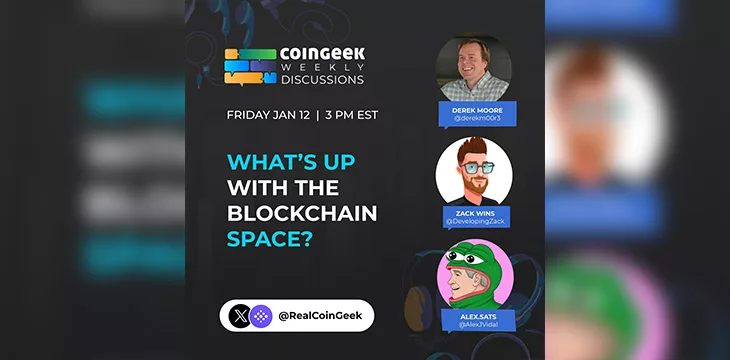|
Getting your Trinity Audio player ready...
|
On the second episode of CoinGeek Discussions in 2024, Alex Vidal and Zachary Weiner hosted entrepreneur, scientist, and programmer Derek Moore. The discussions covered the latest news in the blockchain space, Moore’s personal Bitcoin story, sanctions enforcement, and more. Check it out via this link or read the written summary below.
Introducing Derek Moore
Vidal begins by noting that on the day of the discussion, it’s the anniversary of Bitcoin’s first transaction. On this day 15 years ago, Satoshi Nakamoto sent 10 bitcoins to Hal Finney.
Vidal then introduces Moore as an entrepreneur, scientist, programmer, and engineer. He asks him to tell his Bitcoin story. Moore says he didn’t believe in Bitcoin for a long time and could not understand why cypherpunks were marketing it as a privacy revolution when every transaction is transparent. He thought of it as a “mass surveillance system.”
That said, Moore became interested in Bitcoin again when the scaling debate occurred. He was interested in using it for permanent storage and followed the ongoing scaling disputes between the BCH and BSV camps. When the split became inevitable, he started buying and using the various coins, putting short videos on the blockchain.
What’s the most ground-breaking use case for blockchain?
Moore notes that blockchain could be very good or bad, depending on whose hands it is in. He likens it to a shovel; it can be used to dig a well or can be used as a weapon.
In the end, there can only be one global chain, he says. It must be globally scalable, and BSV blockchain has a very good chance of being that one, he notes. Using a term from game theory, Moore likens the battle to a Highlander game.
Right now, Moore is working on message-passing systems. He says these are essential when it comes to scaling systems. Message passing is at the heart of computing, he says, and messages are needed to distribute work.
On Bitcoin’s potential
Moore says there’s so much potential for Bitcoin’s signatures to be the basis of a “crypto” system. When we add arbitrary data and script, the possibilities are almost endless. For example, Moore sees a potential world where we self-possess our medical records.
Elaborating on this point, Moore says to read Dr. Craig Wright’s blog post on Walmart’s systems. The Bitcoin blockchain can be thought of as the hard drive of the internet, he says. File systems can then be built, and there’s a lot we can do from there.
“Bitcoin is finally the place you can stop losing things,” he states, noting that losing your private keys is still a potential problem.
To learn more about sanctions and how miners can enforce them, Moore’s open-source software development, and why he “rewrote” section 10 of the white paper, check the conversation out via this link. Don’t forget to subscribe to CoinGeek for more posts like this!
Watch: Here’s how Bitcoin works as the base layer for other blockchains

 02-15-2026
02-15-2026 




